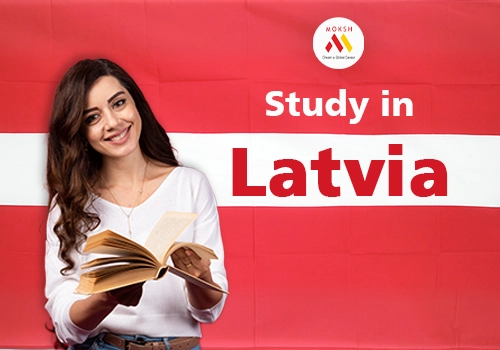

Why study in Europe?
Europe is a top-ranked destination around the world for higher education. Various universities in Europe for international students are well established to provide them their dream career. Several national and international students can grab the opportunity to choose to study in Europe from the extensive range of Bachelor's and Master's courses. Approximately 2750 Higher education institutes in Europe offer more than 50,000 programs for Indian students to study in Europe.
- Study in Europe in English
- Study in Europe at Indian costs
- Exposure to diverse ethnicity during study in EU countries
- Low cost of living make Europe compared to English speaking countries
- Easy post study work permits after study in European countries
- Around 10X average salaries in comparison to India
- High demand for skilled workforce leading to job opportunities
- Work Part time during study in Europe
- Apply for various types of scholarships to study in Europe
Around 100,000 Indian students choose to go to study in Europe every year. More than 80% of these go for Masters degree in Europe . However, the new trend is to go at the Bachelor level.
Best countries to study in Europe

Study in France
France has announced their plan to fill 20,000 jobs for skilled workforce from India by 2025. This is one of the largest opportunity to study in France for Indian students and get settled there for a quality life.
Know More
Study in Germany
Germany has attracted more Indian students than Canada in 2025! The largest Indian student population resides in Germany among all the European countries. Study in Germany & get settled there!
Know More
Study in Italy
Italy provides 100% scholarship for Indian students for many courses at their low cost & high quality universities! More than 6,000 students chose to study in Italy & make their career in Europe!
Know More
Study in Hungary
Study in Hungary is one offers the lowest cost to study among most of the European countries apart from high quality education provided in cities such as Budapest!
Know More
Study in Lithuania
Lithuania is a part of EU and the Indian students choose top ranked universities in Lithuania to get the low cost education with benefit of lowest living costs! The degrees are valid across Europe.
Know More
Study in Latvia
You can study engineering in Latvia at the same cost of any ranked Indian universities. Thats why lately huge flow is seen to be moving towards Latvia.
Know MoreThere are 27 countries in EU where a uniform system for education, Visa acceptance and Euro currency has been established. The 3 best countries to study in Europe are France, Germany and Italy wherein the best universities in Europe for international students are situated. The first thing that the students need to do is to connect with the study in Europe consultants!
The largest Indian communities in Europe are in these 3 countries. However, you can decide about the final destination based on your budget.
Cost to Study in Europe for Indian students

The total cost to study in Europe for Indian students largely depends on the country selected to study in Europe. Also, the cost of tuition fees for EU / EEA students is always different than the Non EU students. Above all, the public universities and private universities in Europe have absolutely different fees structures. The table below provides the average cost of tuition fees and the living expenses in various European countries for public and private institutions.
| Country | Tuition Fees Per Year to Study in Europe in EUR | Living Cost (Per Year) |
|
|---|---|---|---|
| Government Universities | Private Universities | ||
| Austria | EUR 1500 | EUR 6,000 | EUR 9,000 |
| Denmark | EUR 8,800 | EUR 14,000 | EUR 14,000 |
| Finland | Free for Finish taught | EUR 16,000 | EUR 16,000 |
| France | EUR 3800 | EUR 12,000 | EUR 12,000 |
| Germany | Free education | EUR 11,000 | EUR 11,000 |
| Lithuania | EUR 3,500 | EUR 6,000 | EUR 4,000 |
| Latvia | EUR 3,500 | EUR 6,000 | EUR 4,000 |
| Hungary | EUR 1,500 | EUR 6,000 | EUR 5,000 |
| Poland | EUR 1,500 | EUR 6,000 | EUR 7,000 |
| Norway | Free for Norwegian course | EUR 14,000 | EUR 14,000 |
| Slovenia | EUR 5,000 | EUR 11,000 | EUR 12,000 |
| Sweden | EUR 8,000 | EUR 16,000 | EUR 14,000 |
The cost to study Bachelor in Europe is lesser than the costs to study Masters in Europe. The above mentioned cost to study in Europe are for non-medical program. For MBBS in Europe, the cost to study in Europe would be much higher than mentioned above. Many of the students are lured by the agents by getting an offer to study in Europe for free. However, it is very difficult to get admission into government universities to study in Europe for free. Also, 80% of these free of cost study in Europe programs are taught in local language. The free of cost English taught programs at public universities in countries such as Germany and Norway are very few! You can surely speak with the MOKSH expert counselor to arrive at your final dream to study abroad in Europe!

Study in Europe for free
Many European education consultants promote study in Europe for free as an option. There are basically 3 options to Study in Europe:
- Study for free Europe at Public universities (High academics needed)
- Study in Europe at Indian costs in countries like Latvia, Lithuania, Hungary
- Private European university in France, Germany, Italy at half the cost of US / UK
At the public universities, the Indian students can study in EU for free. However, getting admitted to the top ranked universities in the best countries to study in Europe is very difficult! The free education in Europe for Indian students is available only at these public European universities. You also have options like the top ones such as universities Luxembourg are are real expensive.
Out of an estimated 100,000 Indian students going every year to study in Europe, hardly 1% of the students study at free uni in Europe. However, there is no harm in trying for the undergraduate studies in Europe or the masters in Europe for free!
Study in Europe at the cost of India
In India, career options for Undergraduate and Post-graduate level study programs are very limited. There are only a few institutes like IITs & IIMs that matches with the best engineering universities Europe in the field of Engineering and Management. You may choose to study engineering in Europe in English benefit from high job demand and 10X salary structures leading to better quality of life. Due to the easy immigration / migration rules for the skilled workforce, you can plan to study and live in Europe by planning the career right from the Bachelor level.
Here's the table that provides the comparison of estimated tuition fees in India & Europe for popular programs at top ranked universities.
| Program | Yearly Cost in India (INR) | Yearly Cost in Europe (INR) |
|---|---|---|
| MBA course | INR 400,000 | INR 400,000 |
| Engineering | INR 300,000 | INR 300,000 |
| Architecture & design | INR 300,000 | INR 500,000 |
| Hospitality & Tourism | INR 300,000 | INR 4,00,000 |
| Medicine | INR 12,00,000 | INR 12,00,000 |
| Social Science | INR 300,000 | INR 400,000 |
In the above table, we have compared programs offered by the best universities in Europe for international students Vs. the Indian universities having lower world rank! It means, you can study in Europe at better university at a lower cost than India!
The cheapest countries to study in Europe for international students can be Latvia, Lithuania, Hungary and Poland. In these countries, you can study in Europe at the cost of India at Bachelor and Master’s level.

Nursing Program in Europe
Explore the top nursing programs in Europe and discover the benefits, curriculum, admission requirements, and career opportunities available.
Know More
Engineering Program in Europe
Explore Europe's Leading Engineering Programs, Popular Engineering Universities, and Admission Requirements. Unlock the World of Innovation and Technology in European Engineering Education.
Know More
Business Program in Europe
Explore Business Programs in Europe for bachelor's and master's degrees. Get a world-class education at top business schools in Europe.
Know MoreThe cheapest countries to study in Europe are Latvia, Lithuania, Hungary, and Poland. In these countries, you can look in Europe at the cost of India at the Bachelor's and Master's levels.
Study in Europe without IELTS
The Indian students from Gujarat and Punjab states as well as Tier 2 & 3 cities across India find it extremely difficult to get respectable IELTS score. These students have huge aspirations to study abroad and accordingly choose to study at international university in Europe wherein English proficiency is not mandatory.
Till 2005, there were very few universities with selected course in Europe teaching in English. However, in the last decade there are hundreds of courses taught in English are offered Masters in Europe for Indian students. However, the best part at the application stage is you apply and study in Europe without IELTS score. Very few uni in Europe require IELTS score as an eligibility criteria. They finally make their choice for European countries without IELTS. In case you are looking for without IELTS study visa in Europe, you may contact us now!


Eligibility Criteria to study in Europe:
Even though IELTS is not required, there are basic eligibility criteria to study in Europe such as:
- Minimum 55% or equivalent grades, however, it may vary with any particular country or specific Europe university
- Instruction of Medium in previous studies must be in English for master programs in Europe
- Specific Subjects in previous studies based on opted Specialization if you choose to study at the European best universities
- Many uni of Europe may ask for specific Grades, English Proficiency scores, Subjects studied, or duration of your previous course.
The top universities in Europe for international students accepts students from 170+ countries.The world is able to reach there since the requirements to study in Europe are not very difficult to match!

Popular Course in Europe
Apart from the excellence in education, students at the best universities to study in Europe get diverse cultural experiences, food, art, music, and travel opportunities.
In Europe, program lengths and admission requirements will differ depending on the institution and the country. Many options to study IT in Europe or MS in Europe for Indian students are available at the same cost of Indian universities!
Let’s take a look at some of the most preferred study courses in different countries.
| Courses | Suitable country | Cost in EUR Per Year |
|---|---|---|
| Study Architecture in Europe | France | EUR 14,000 |
| Study Psychology in Europe in English | Germany, France | EUR 9,000 |
| Study international business in Europe | Germany, France, Hungary | EUR 6,000 |
| Study animation in Europe | France, Hungary | EUR 6,000 |
| Study Biotechnology in Europe | Germany, France | EUR 14,000 |
| Study BBA in Europe | Germany, France, Hungary | EUR 9,000 |
| Study at the cheapest MBA in Europe | Germany, France | EUR 7,000 |
| Study nursing in Europe | Germany via Georgia | EUR 3,500 |
| Study Mechanical engineering in Europe in English | Latvia, Germany | EUR 3,500 |
| Study Robotics in Europe | Latvia, Germany | EUR 4,000 |
| Study Medicine in Europe in English | Poland, Germany | EUR 12,000 |
All these courses are available to study masters in Europe for free at Public universities while you can study in Europe at Indian costs in countries such as Lithuania, Latvia and Hungary.

Benefits of Studying in Europe
Europe houses some of the world's most prominent universities. The best countries to study in Europe have the world’s top 150 universities in the QS 500 ranking list. Moving away from your native country will not only let you achieve high-quality academics at an affordable cost but also let you gain international experience. There are many benefits to study abroad in Europe for Indian students.
- International Exposure:
- High quality education:
- Scholarship
- Research opportunities:
- Global Employment opportunities:
- High salaries:
- Option to immigrate
Study in Europe Consultants
Any student who wishes to study in Europe must be aware of the fact that the process of application to the universities in Europe is lengthy and complex. Generally the students choose to apply through study abroad Europe consultants in Mumbai.These study in Europe consultants will help you finalize the decision on where to study abroad in Europe.
The students planning to study abroad take support from the study in Europe consultants for various types of overseas educational consultancy services offered by them:
- Course Matching with best study abroad programs to study in Europe
- Selection for the cheapest countries to study abroad in Europe
- Selection of the University
- English Proficiency Exam Preparation
- Helping in SOP / Letter of Motivation
- Application to the University
- Preparation for University Interview
- VISA documentation & Interview Guidance
- FOREX Support
- Travel Arrangements
The study abroad consultancy services for Europe should be availed after checking this whole list carefully. These services will allow you to study at the best countries to study in Europe in English.
MOKSH can support you for your journey for your requirements from various locations such as:
- Europe study center or Study in Europe consultants in Mumbai
- Study in Europe consultants in Bhopal
- Study abroad consultancy services in Indore
- Study in Europe consultants in Kerala
- Europe study consultants in Chennai
Intakes of European Universities
Generally, there are 2 intakes offered by the European Universities for many programs. The autumn intake (September) is guaranteed by most of the universities while the spring intake (March) intake is based on the batch formation. The Indian students willing to study in Europe are recommended to initiate their application at least 6-12 months in advance depending on the country, course and the university.
| Intake | Deadline app | Participating Universities |
|---|---|---|
| September | 15th June | All |
| February | 15th Nov | Many |
Students can get scholarships in many universities if they apply through MOKSH at 200+ universities in the top study destinations in Europe.
ERASMUS Scholarship in Europe

The study of Europe is absolutely uniform in all 27 countries since it is based on ECTS (European Credit Transfer System) basis.This system allowed them to launch an Erasmus Europe Scholarship.
Europe runs plenty of scholarship programs to support education, training, youth, and sport in Europe. The Erasmus+ program came into action in 1987, with the ulterior motive to fund scholars. You can opt for Europe scholarship for Indian students once you start your study in university in Europe which is a member of Erasmus.
The enrollee can get coverage from 2 months to 24 months under this program. The scholarship to study in Europe for Indian students are available under the ERASMUS program after the first year of study.
Student exchange Program in European Universities
Under Student Exchange Program, students are eligible to get Monthly. Likewise, students moving to other countries will receive a scholarship of 210 € per month towards scholarship to study in Europe. In general, this Europe scholarship may cover your Tuition fees and can even provide you with free accommodation (Certainly, they will assist you in finding suitable accommodation). In case, you need to enquire about the exchange program, your local Erasmus office at the university can assist you while you study in Europe!

Part time Jobs in Europe
As per the Law of European Union, an International student has the right to work while studying. Indian students studying in Europe are allowed to work part-time during the academic year and full-time during holidays. Hence, as long as, the student is enrolled in a university, he / she can work full-time, meaning up to 20 hours per week. Their living cost can be taken care by way of working part time.
Generally, the jobs are in cafes, library, restaurants, research work within university or paid internships.
Study and Settle in Europe
As a non-European citizen, you can pick and choose from numerous work options ranging from the short-term to the long-term. In addition, some of the countries where you can easily get a work visa are Germany, Denmark, Portugal, and Finland. Moreover, these countries launch new openings every year to attract skilled personnel willing to migrate. Meanwhile, getting a work visa is comparatively easy in such countries.







.png)
